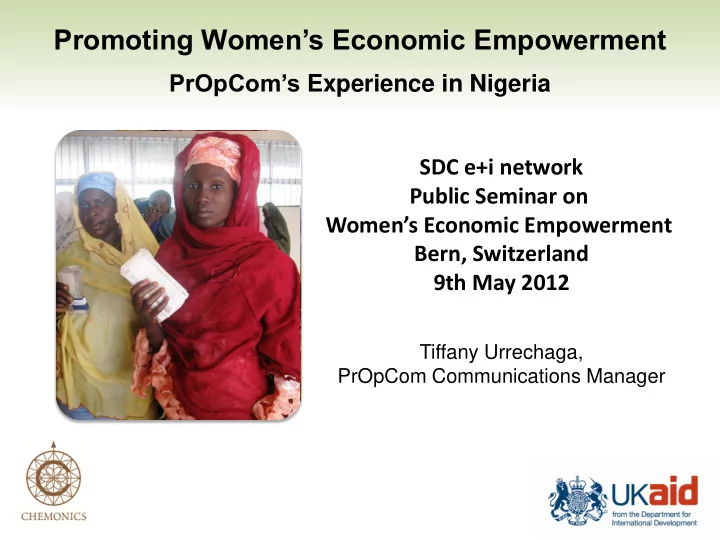

Promoting Women’s Economic Empowerment PrOpCom’s Experience in Nigeria SDC e+i network Public Seminar on Women’s Economic Empowerment Bern, Switzerland 9th May 2012 Tiffany Urrechaga, PrOpCom Communications Manager
Structure of today’s presentation What is PrOpCom? How did PrOpCom address economic empowerment of women? Results achieved Lessons learned for M4P
PrOpCom (Promoting Pro-Poor Opportunities through Commodity and Service Markets) • £15.3 million DFID- funded M4P programme • Phase 1 implementation began in 2006 with commodity-based interventions in southwest and northern Nigeria
PrOpCom (Promoting Pro-Poor Opportunities through Commodity and Service Markets) • £15.3 million DFID- funded M4P programme • Phase 1 implementation began in 2006 with commodity interventions in southwest and northern Nigeria • Phase 2 began in 2009, and ended in 2011 with broad geographic reach in service markets
Most impact on women found in two support markets SUPPORTING 14% FUNCTIONS Highest ratio Fertiliser of female to male Information services beneficiaries Seeds Marketing Equipment Finance 100% Parboiling Milling RICE MARKETS Quality standards Attitudes about local rice Rice policies RULES
How did we address economic empowerment of women? Parboilers intervention Targeting core markets where 1 poor women work. Examining the relationship between income increases and 2 women’s economic empowerment .
PrOpCom was active in the Kano rice value chain Processing Marketing Production Paddy Milling Sorting Drying cultivation Harvesting Packaging Threshing & Parboiling Distribution winnowing In Kano, 99% of parboilers are women
Why intervene in parboiling? • Hydrothermal treatment of rice paddy • Improves milling efficiency & nutritional value • 87% of rice purchased in urban Nigerian markets is parboiled
Two parboiling interventions in two northern states 1 2 Kano Adamawa
How did PrOpCom monitor its impact on women’s income? Impact on Women parboilers increase profits poor Additiona itional l net t income me Core Women use loans as working capital & of employ new business practices market £1,8 ,858, 8,938 38 Women trained in new business practices and for r technology Support 817 7 market parbo rboiler ilers Loans disbursed to women PrOpCom and bank help women gain access to finance / technical advice Activities PrOpCom links bank to women PrOpCom partners with bank
How did the additional net income differ by state? Change in annual profit % change £1'861 £2'000 200% 163% £1'500 150% £1'000 100% 67% £500 50% £256 £0 0% Kano Parboilers Adamawa Kano Parboilers Adamawa Parboilers Parboilers
Moving from income to empowerment Assets 1 Decision making 2 Look at social Roles and responsibilities 3 context Household Business Community
Increased investment in business assets was measured quantitatively % change in investments 150% 122% 125% 100% 78% 73% 69% 68% 75% Rice paddy 58% Labour 50% Assets 25% 0% Kano Parboilers Adamawa Parboilers Note: Assets include livestock, land, farm equipment, poultry, and savings
Changes in decision-making and roles & responsibilities Decision making over discretionary purchases + Status in household and community + Change in professional roles & responsibilities + in Kano Final decision making authority Change in household roles & responsibilities
Challenges to sustainability Scale vs. depth of impact 1 Embedding mentoring for women into market 2 actors’ services
Our learnings on women’s economic empowerment in M4P Gender lens Pro-poor Poverty access or reduction growth Using a portfolio approach, M4P potential potential programmes can employ a ‘gender 1 lens’ to target specific markets M4P intervention potential • Decision making • Increase in assets • Roles & responsibilities If M4P programmes aim to move from income to empowerment , they 2 need to include additional indicators Poverty reduction M4P programmes CAN change women’s professional 3 roles and business decision-making capacity
A final word on empowerment… Ow Owner nership ship “No matter how bad your own thing is, it’s better than the good thing that is not yours.”
Thank you. Qu Questions? estions? For more information: • Visit www.propcom.org • Pick up CD copy (limited quantity)
Backup
Study on women’s decision -making - Survey of 200 women, Kaduna state, Damisa and Yohanna, 2007.
What were the associated social changes? - Survey of 20 women, Kano state, PrOpCom, 2011.
Lessons learned In Nigeria, money can buy you love 1 (or at least some R-E-S-P-E-C-T). “Women don’t go [to the market]. Men go, so 2 why bother myself?”
Recommend
More recommend